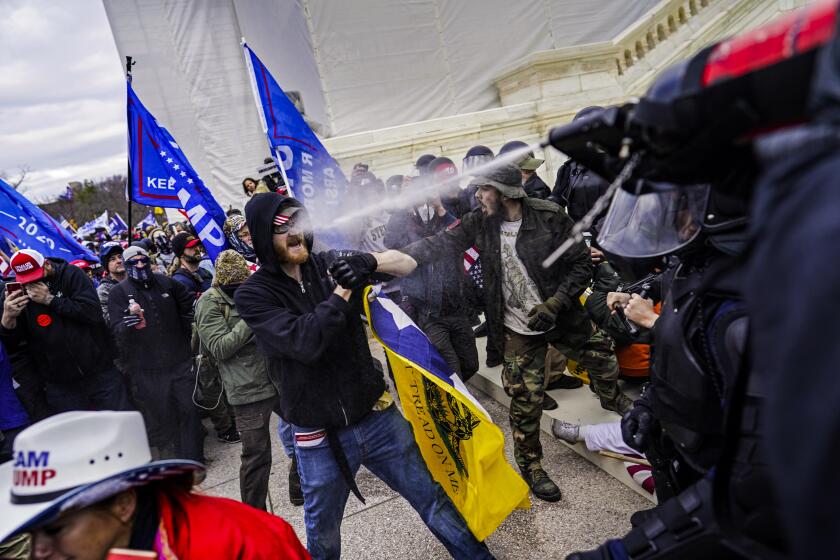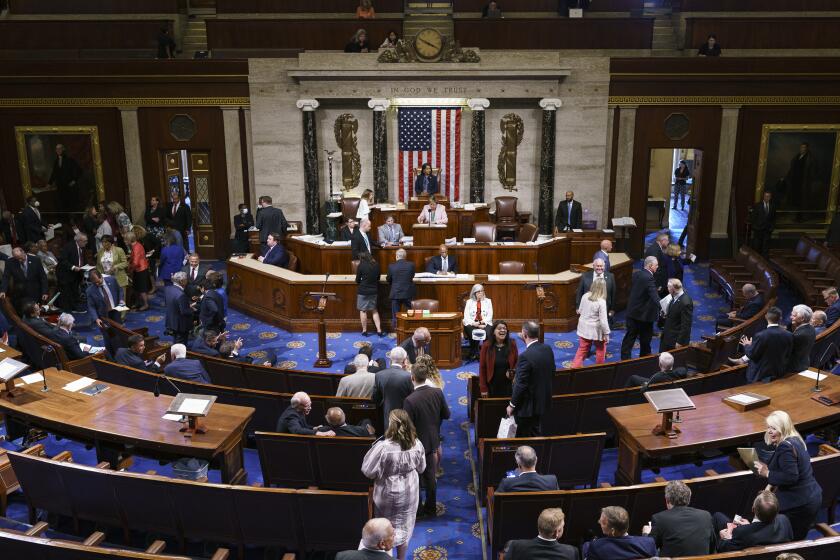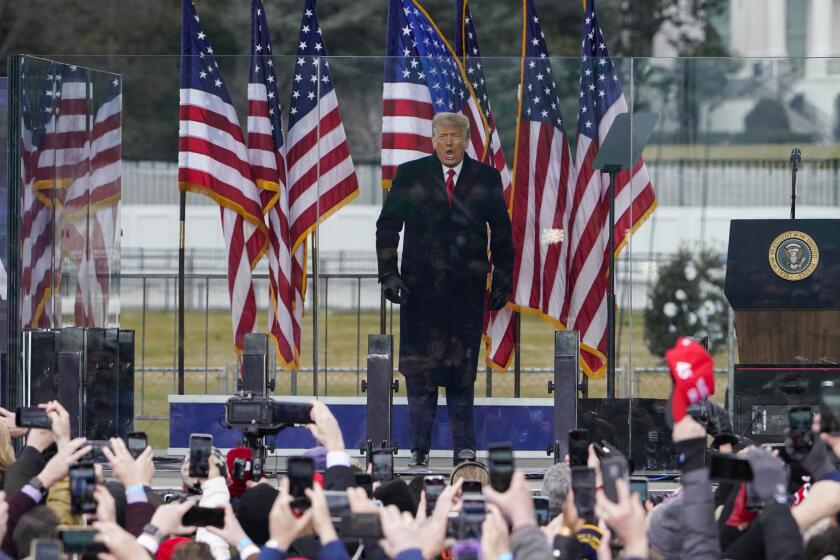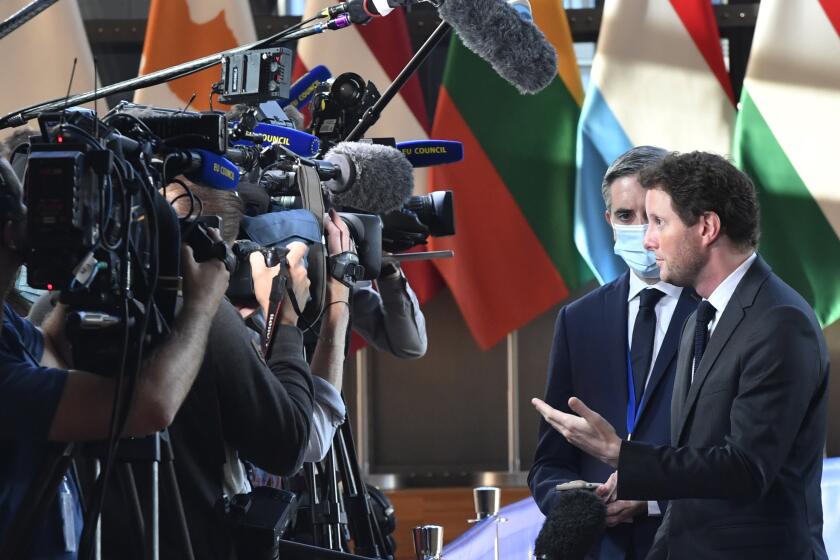As Capitol riot anniversary nears, Western allies fear for health of U.S. democracy
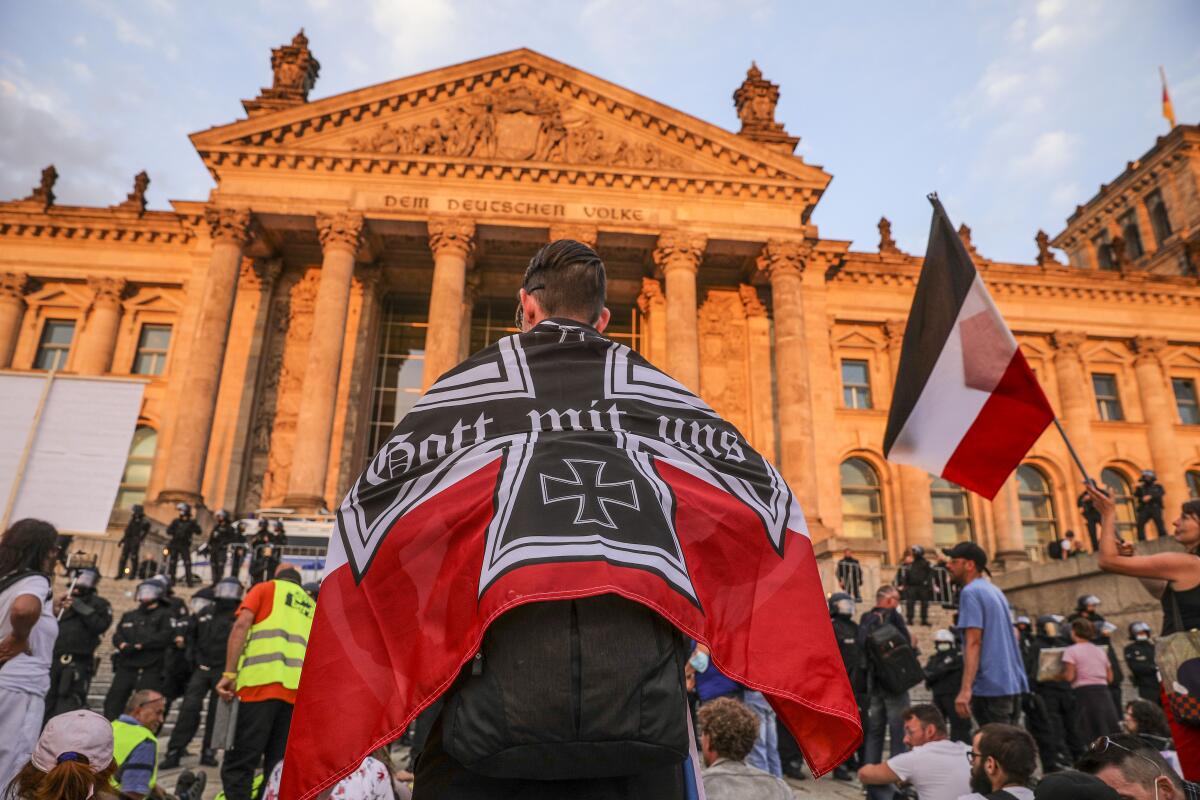
- Share via
BERLIN — Last Jan. 6, the world watched in shock as a pro-Trump mob stormed the U.S. Capitol, seeking to disrupt the certification of Joe Biden’s election victory. One year on, many of America’s closest allies are still profoundly concerned about the state of U.S. democracy.
In Western Europe, major powers were openly relieved by President Trump’s exit from the Oval Office. Even so, there is a sense among them that the long-term threat to U.S. democratic institutions remains.
Perhaps nowhere is that feeling more acute than in Germany, rebuilt from the ashes of World War II, thanks in no small measure to the helping hand extended by its former adversary, the United States. The country still bears the imprint of 20th century traumas, including the prewar slide from democracy into Nazism and the East-West division that ended with the fall of the Berlin Wall in 1989.
“I do think it is fair to say that there is great concern in Europe, and in my own country, about the challenge to democracy in America,” said Constanze Stelzenmueller, a German scholar and expert on transatlantic relations at the Brookings Institution. “It’s becoming clear to everyone that Jan. 6 wasn’t just an isolated episode. It was part of something larger, more deeply rooted, and more pernicious.”
Groups that study democratic metrics see much of the world on a troubling trajectory, with the United States being no exception. In November, a European think tank, the International Institute for Democracy and Electoral Assistance, for the first time put the U.S. on a list of “backsliding democracies.”
“The United States, the bastion of global democracy, fell victim to authoritarian tendencies itself, and was knocked down a significant number of steps on the democratic scale,” the Stockholm-based organization wrote.
Never-before-seen footage of the chaos during the Jan. 6 attack on the U.S. Capitol, from Los Angeles Times photographer Kent Nishimura’s GoPro.
Autocrats like Russian President Vladimir Putin and Hungarian Prime Minister Viktor Orban have long jeered at the bedrock principles of liberal democracy, pointing to the Capitol riot as another emblem of a failing system.
But expressions of genuine concern are commonplace as well — coming from allied leaders who see their own security as bolstered by a robust American democracy.
President Biden said as much last month in a commencement address at South Carolina State University, in which he marveled at the tone of his exchanges with global leaders since taking office.
“I’ve spoken to over 140 heads of state since I became president,” he said. “Do you know what they all ask me? ‘Is America going to be all right? What about democracy in America?’”
The House panel investigating the Jan. 6 Capitol insurrection is planning televised hearings and a series of reports in the coming months.
Then he posed a rhetorical question to himself: “Did you ever think you’d be asked that question by another leader?”
Political scientists warn that anti-democratic leaders tend to align themselves in what amounts to a friendly ecosystem. On Monday, Trump — in an unusual intercession in another country’s domestic politics by a former U.S. president — offered up his “complete support” for Orban, whose far-right party faces elections in the spring.
Fellow European Union leaders have accused the Hungarian prime minister of systematically subverting his country’s constitution and democratic institutions, including its judiciary and the independent press. Lionized in far-right U.S. circles and shunned by multiple U.S. administrations, Orban enjoyed a warm welcome to Trump’s White House.
Concern over the long-term U.S. commitment to traditional democratic values may be running highest among the country’s postwar allies in Europe, who make up the core of the North Atlantic Treaty Organization. But they are not the only ones worried.
People don’t usually land in jail for doing nothing. But President Trump’s scandalous inaction while the Capitol was under attack could be cause for a criminal referral from Congress.
Canada’s leading newspaper, the Globe and Mail, published an op-ed last month by author and academic Thomas Homer-Dixon, who warned that the United States could be headed for “extreme domestic political instability” that could have dangerous repercussions for its northern neighbor.
“We mustn’t dismiss these possibilities just because they seem ludicrous or too horrible to imagine,” the Canadian political scientist wrote.
Domestic political quarrels are nothing new, in the United States or elsewhere, but the strikingly bitter tone of American political discourse is alarming to some onlookers, whether or not it actually explodes into violence, as on Jan. 6.
In a country such as Germany, which has embraced consensus-based politics, the unrelenting U.S. rancor stirs particular unease.
France’s EU partners have agreed to put the country’s security spat with the U.S., Britain and Australia at the top of the bloc’s political agenda.
“The polarization that you see in America, it terrifies the German public and media — the very black-and-white politics with little common ground,” said Maurice Frank, a former newspaper editor who writes a newsletter aimed at English-speaking expatriates in Germany. “There doesn’t seem to be much space for compromise.”
Many in Europe are following news of the ongoing effort, spearheaded by the congressional committee investigating the Capitol attack, to determine the full extent of the effort by Trump and his allies to overturn the 2020 election result.
“The truth continues to emerge about the day when American democracy trembled on its foundations,” said an editorial in the French newspaper Le Monde in October.
But amid the crush of new crises — the COVID-19 pandemic exploding anew, Russia’s threatening stance toward Ukraine — some ordinary Germans see the Capitol riot as fading into the background.
Breaking News
Get breaking news, investigations, analysis and more signature journalism from the Los Angeles Times in your inbox.
You may occasionally receive promotional content from the Los Angeles Times.
“It already seems like a long time ago,” said Rune Roas, a 30-year-old German businessman strolling through Christmas crowds in Alexanderplatz, the sprawling plaza at the heart of what used to be East Berlin.
Germany had its own Parliament-storming scare in August 2020, when a few hundred right-wing protesters broke through a police barricade and pushed their way toward the steps of the Reichstag. But it ended quickly, with protesters pushed back by police without entering the building.
“What’s amazing to me is the way the protesters in the U.S. were able to just, well, force their way in,” said Roas. “That’s the part that’s still hard for anyone to believe.”
European analysts are quick to point out that the continent has its own problematic relationship with extremist right-wing movements. Even so, the Jan. 6 riot may have accelerated a trend of increasing disillusionment with the United States as a beacon of pluralism and democracy.
A widely cited poll conducted in 16 advanced economies last year by the Pew Research Center said a median of just 17% of those surveyed consider American democracy “a good model for other countries to follow.” Biden’s election brought an uptick in favorable sentiment toward the United States, but to many, especially the younger generation, the notion of a shining city on the hill seems like a relic of long-ago times.
“Music, movies, cultural things — yes, sure, we still look to America for that,” said Lisa Veppemch, a 27-year-old Berliner who was browsing in an art supplies store. “But their way of doing things, politically — not so much.”
More to Read
Sign up for Essential California
The most important California stories and recommendations in your inbox every morning.
You may occasionally receive promotional content from the Los Angeles Times.
